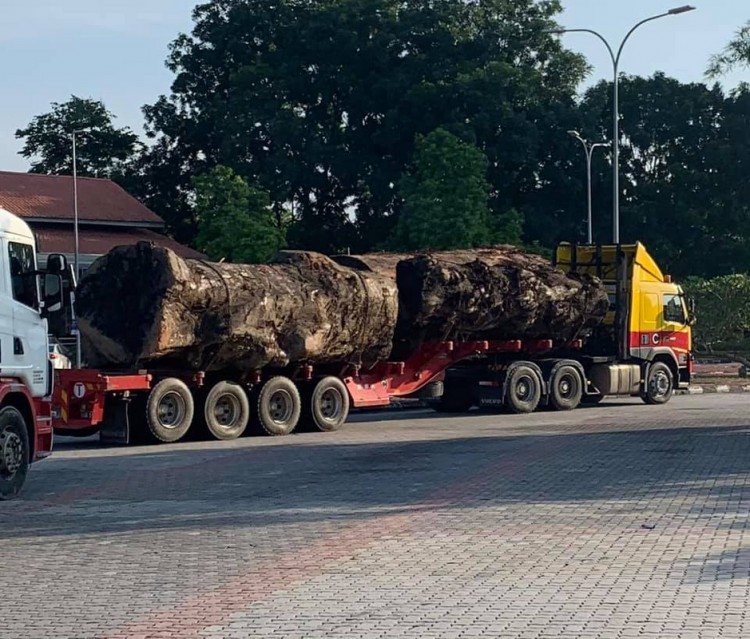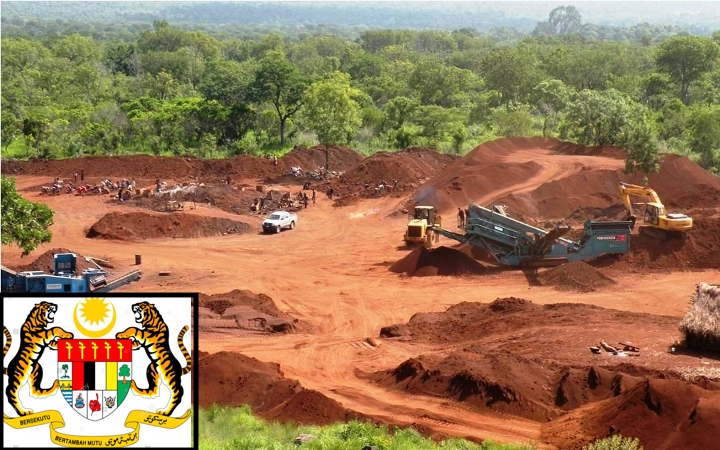The revelation this past week that the Agong’s aunty and another royal relative from Kelantan are the owners of a RM2.00 company that has just been awarded a sizeable and destructive concession to mine for manganese and other minerals in an environmentally sensitive region of Pahang presents a weary familiarity for Malaysians. The country has been ravaged by such projects.
Hanishah Ventures Son Bhd has been in existence since 2012 and describes its business as “mining for ores valued chiefly for iron content”. However its assets stand at a paltry RM7,000 versus liabilities of over RM41,000.
Despite the hollow nature of the company it has been awarded the 40 hectare concession by the Agong’s home state of Pahang in an area of threatened environmental importance that the state government only recently pledged to protect from further degradation.
One presumes the license was granted over a slate of competitive tenders and for reasons of economic advantage for the state. Yet who is to know, since basic transparency concerning the decision making processes in such matters is notably absent in Pahang?
Sarawak Report has discovered as much when trying to determine the reasons behind other nonsensically destructive projects in the state, including those with royal connections. The region is dotted with similar mining concessions and mysterious logging, including the illegal raid on a last remaining ancient tree carried out in broad daylight also during the past just seven days for all to see.

What is clear is that for reasons not disclosed this RM2.00 royal owned company was granted an exemption to tear up the land in an area that was gazetted by the state as a Forest Reserve as recently as 2019.
Like other states in the federation where secretive negotiations have resulted in the parcelling of vast tracts of land to politically connected people, Pahang is on the verge of environmental disaster as a result: wildlife is being wiped out, pollution is becoming a major problem for increasing numbers of inhabitants affected by mining effluents and communities of indigenous people are being thrown out of their homes by loggers then dragged into court and fined for trying to protest.
All this while the royal household in the state has, like so many of their neighbours, gone from wealth to extreme wealth. The present Agong houses his hundred or so prized Argentinian polo ponies in air-conditioned stables at his vast palace, rivalled only by the luxuriousness and wealth of the other sultans of Malaysia’s poorest states.
The conclusion has to be that, like the Taib family of Sarawak, if the Sultans or their families say they want something in their state then the decision making bodies, who are supposed to be there to protect and guard the national wealth on behalf of the community at large, unfortunately grant it.
Forget due process, planning, legal procedure, due profit to the state – the overgrown toddlers in the palace have identified yet another source of cash to pay for their excessive lifestyles, so they must have it.
It is at this point that Malaysians need to decide whether they are content to continue to allow a medieval situation to exist behind their facade of a modern state, in a manner that will inevitably and rapidly drive a once rich and developing country into economic ruin and environmental catastrophe, or put their foot down and implement the rules?
Malaysia is a democracy after all, where resources are owned by the state and subject to the rule of law, rather than being in the personal possession of the monarch or subject to his whim. The worst aspect of this self indulgent plunder by the super-wealthy but predominantly useless ‘businessmen royals’ is that they are soaking up cash that could otherwise have been directed into elevating the lives of the poorest people in their states.
Billion dollar palaces, horses, jets, super-sports vehicles, foreign properties, handbags, cosmetic surgery, diamonds, couture, nearly all of which are provided by foreign profiteers, have diverted funds that could have gone into hospitals, houses, roads and schools. The ostentation is there for all to see and it brings shame on a country where so many in the population suffer.
Moreover, this raid on Malaysia’s resources, driven by foreign technology and greed without governance, has carried on over the past few decades as if there were no tomorrow: as if the glorious natural wealth and beauty of the country was worth nothing at all compared to printed dollar notes to buy transient trophy toys and branded goods.
With symbolic irony the glorious tiger which the royals proudly display as their emblem of strength and power is living out its last days in Malaysia with less than a hundred calculated to be still living in the wild. These are subjected to cruel poaching, habitat loss and the diseases that come with the encroachment of human populations.
Some royal leaders have responded by remembering their responsibilities when it comes to the environment (an example of how these families could be restored to a useful role) others have simply put a few in cages or despoiled their lovely lands completely.
In the process, these sprawling, selfish families (poor Malaysia with a population of 30 million people is saddled with no less than nine royal houses to maintain) are failing to appreciate that they are becoming every bit as redundant as the beleaguered tiger, particularly if they kill off everything they used to represent.
Most modern states have already done away with Kings and Queens, either to be replaced by democratic progressive structures or uglier forms of dictatorship. Malaysia could go either way. The places where monarchies have successfully progressed with the times are where the royal families have modernised and learnt their place, particularly when it comes to not considering themselves above the law or the due processes that apply to everybody else.
It has usually been the result of hard lessons learnt. Back in 1642 the British executed their King, who being typically inbred and pampered had come to the conclusion that he was appointed by God and needed to listen to no-one else.
These are the characteristic problems that develop with inherited, over-powerful leaderships and after a few more hiccups (the son of this particular failure turned out to be every bit as slow to learn and had to be chased abroad) Britain’s royals and their people established an understanding.
The monarch is now primarily in place to remind any temporary top politician that they will never be the most important person in the state, but in return does not get involved in politics themselves or freelance business off their connections either.
As their quid pro quo the royals of Britain and various other similar constitutional monarchies are given respect and pomp plus a very fine allowance and privileged lives. They tend to be fondly respected for the limited but vital role they play, depending on how well they do it.
This is the model also adopted by Malaysia, in principle at least. Yet, all the evidence points to the reality that deference to these royal families has allowed them to get away with muscling in on the politics and economic life of their home states and the federation, enriching themselves astonishingly in the process.
Time and again major projects turn out to have been driven by royal business interests with the granting of licences and concessions a mere formality for companies known to have royal connections. Huge chunks of shares are doled out in return to the family members and proxies of these players all at the expense of the wider interest of the state and proper planning and governance.
Such licence fuels more greed and jostling for goodies, and with the backdoor establishment of the PN government, primarily to counter the reforming attempts of the last elected government, the gold rush appears to be spiralling out of control entirely.
Having closed down Parliament and suspended all checks and balances on the spurious grounds of the Covid emergency the present regime has done away with remaining scrutiny at national level, let alone in the home states.
And on top of the entire edifice presently sits an Agong who has flagrantly abused his constitutional role by endorsing the suspension of Parliament and appointing a puppet prime minister (a rebel against his own elected government) rather than the favoured choice of the vast majority of elected MPs and the leader of the largest coalition.
The same Agong, who displays symptoms of having got away with ignoring due process too often back home in Pahang (the political base of the convicted ex-PM Najib Razak), even decided to do away with one remaining check on his constitutional powers by cancelling the Council of Rulers meeting which had been originally called to consider the proposed ‘state of emergency’ to keep his chosen prime minister in office.
A previously convened Council of Rulers had rejected the same proposal just a few weeks earlier, which is presumably why he cancelled the subsequent one to determine the same matter.
Such high handed actions confront, test and challenge the institutions of democracy and the core principles of checks and balances. They thereby lead to instability, threatening dictatorship and frustrated rebellion, as seen with sad consequences elsewhere.
There is no need for this in Malaysia but there is a sense that the present love affair amongst some royals with the Middle East betrays a longing for the more absolutist system such as exists amongst the former tribal kingdoms of the Gulf oil states. Having tasted the fruits of ‘fast car monarchy’ do they crave for more?
If there continues to be a tolerance in Malaysia for royal self-dealing, unconstitutional business activities and total lack of transparency in the handling of public resources this is sadly where the country will fast slide. The once lush green and fertile homelands of the Malaysian people will become as parched and unproductive as those Arab wastelands with just a few privileged royal families living it large on the remaining resources, till those run out.

